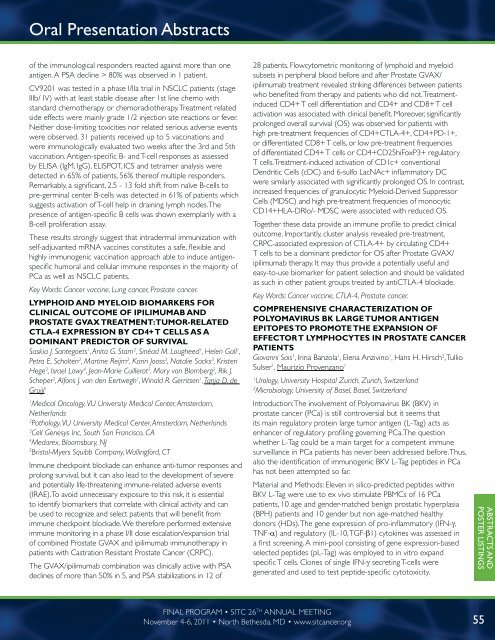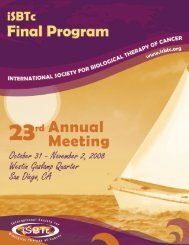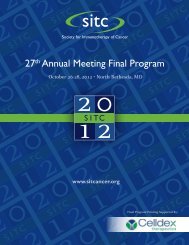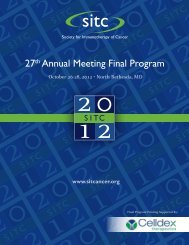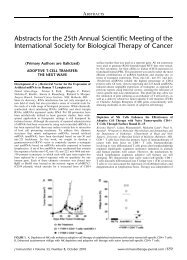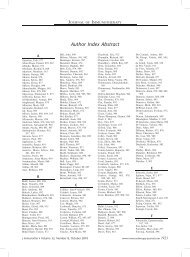FINAL PROGRAM - Society for Immunotherapy of Cancer
FINAL PROGRAM - Society for Immunotherapy of Cancer
FINAL PROGRAM - Society for Immunotherapy of Cancer
You also want an ePaper? Increase the reach of your titles
YUMPU automatically turns print PDFs into web optimized ePapers that Google loves.
Oral Presentation Abstracts<br />
<strong>of</strong> the immunological responders reacted against more than one<br />
antigen. A PSA decline > 80% was observed in 1 patient.<br />
CV9201 was tested in a phase I/IIa trial in NSCLC patients (stage<br />
IIIb/ IV) with at least stable disease after 1st line chemo with<br />
standard chemotherapy or chemoradiotherapy. Treatment related<br />
side effects were mainly grade 1/2 injection site reactions or fever.<br />
Neither dose-limiting toxicities nor related serious adverse events<br />
were observed. 31 patients received up to 5 vaccinations and<br />
were immunologically evaluated two weeks after the 3rd and 5th<br />
vaccination. Antigen-specific B- and T-cell responses as assessed<br />
by ELISA (IgM, IgG), ELISPOT, ICS and tetramer analysis were<br />
detected in 65% <strong>of</strong> patients, 56% there<strong>of</strong> multiple responders.<br />
Remarkably, a significant, 2.5 - 13 fold shift from naïve B-cells to<br />
pre-germinal center B-cells was detected in 61% <strong>of</strong> patients which<br />
suggests activation <strong>of</strong> T-cell help in draining lymph nodes. The<br />
presence <strong>of</strong> antigen-specific B cells was shown exemplarily with a<br />
B-cell proliferation assay.<br />
These results strongly suggest that intradermal immunization with<br />
self-adjuvanted mRNA vaccines constitutes a safe, flexible and<br />
highly immunogenic vaccination approach able to induce antigenspecific<br />
humoral and cellular immune responses in the majority <strong>of</strong><br />
PCa as well as NSCLC patients.<br />
Key Words: <strong>Cancer</strong> vaccine, Lung cancer, Prostate cancer.<br />
LYMPHOID AND MYELOID BIOMARKERS FOR<br />
CLINICAL OUTCOME OF IPILIMUMAB AND<br />
PROSTATE GVAX TREATMENT: TUMOR-RELATED<br />
CTLA-4 EXPRESSION BY CD4+ T CELLS AS A<br />
DOMINANT PREDICTOR OF SURVIVAL<br />
Saskia J. Santegoets 1 , Anita G. Stam 2 , Sinéad M. Lougheed 1 , Helen Gall 1 ,<br />
Petra E. Scholten 2 , Martine Reijm 2 , Karin Jooss 3 , Natalie Sacks 3 , Kristen<br />
Hege 3 , Israel Lowy 4 , Jean-Marie Cuillerot 5 , Mary von Blomberg 2 , Rik J.<br />
Scheper 2 , Alfons J. van den Eertwegh 1 , Winald R. Gerritsen 1 , Tanja D. de<br />
Gruijl 1<br />
1<br />
Medical Oncology, VU University Medical Center, Amsterdam,<br />
Netherlands<br />
2<br />
Pathology, VU University Medical Center, Amsterdam, Netherlands<br />
3<br />
Cell Genesys Inc, South San Francisco, CA<br />
4<br />
Medarex, Bloomsbury, NJ<br />
5<br />
Bristol-Myers Squibb Company, Walling<strong>for</strong>d, CT<br />
Immune checkpoint blockade can enhance anti-tumor responses and<br />
prolong survival, but it can also lead to the development <strong>of</strong> severe<br />
and potentially life-threatening immune-related adverse events<br />
(IRAE). To avoid unnecessary exposure to this risk, it is essential<br />
to identify biomarkers that correlate with clinical activity and can<br />
be used to recognize and select patients that will benefit from<br />
immune checkpoint blockade. We there<strong>for</strong>e per<strong>for</strong>med extensive<br />
immune monitoring in a phase I/II dose escalation/expansion trial<br />
<strong>of</strong> combined Prostate GVAX and ipilimumab immunotherapy in<br />
patients with Castration Resistant Prostate <strong>Cancer</strong> (CRPC).<br />
The GVAX/ipilimumab combination was clinically active with PSA<br />
declines <strong>of</strong> more than 50% in 5, and PSA stabilizations in 12 <strong>of</strong><br />
28 patients. Flowcytometric monitoring <strong>of</strong> lymphoid and myeloid<br />
subsets in peripheral blood be<strong>for</strong>e and after Prostate GVAX/<br />
ipilimumab treatment revealed striking differences between patients<br />
who benefited from therapy and patients who did not. Treatmentinduced<br />
CD4+ T cell differentiation and CD4+ and CD8+ T cell<br />
activation was associated with clinical benefit. Moreover, significantly<br />
prolonged overall survival (OS) was observed <strong>for</strong> patients with<br />
high pre-treatment frequencies <strong>of</strong> CD4+CTLA-4+, CD4+PD-1+,<br />
or differentiated CD8+ T cells, or low pre-treatment frequencies<br />
<strong>of</strong> differentiated CD4+ T cells or CD4+CD25hiFoxP3+ regulatory<br />
T cells. Treatment-induced activation <strong>of</strong> CD1c+ conventional<br />
Dendritic Cells (cDC) and 6-sulfo LacNAc+ inflammatory DC<br />
were similarly associated with significantly prolonged OS. In contrast,<br />
increased frequencies <strong>of</strong> granulocytic Myeloid-Derived Suppressor<br />
Cells (MDSC) and high pre-treatment frequencies <strong>of</strong> monocytic<br />
CD14+HLA-DRlo/- MDSC were associated with reduced OS.<br />
Together these data provide an immune pr<strong>of</strong>ile to predict clinical<br />
outcome. Importantly, cluster analysis revealed pre-treatment,<br />
CRPC-associated expression <strong>of</strong> CTLA-4+ by circulating CD4+<br />
T cells to be a dominant predictor <strong>for</strong> OS after Prostate GVAX/<br />
ipilimumab therapy. It may thus provide a potentially useful and<br />
easy-to-use biomarker <strong>for</strong> patient selection and should be validated<br />
as such in other patient groups treated by antiCTLA-4 blockade.<br />
Key Words: <strong>Cancer</strong> vaccine, CTLA-4, Prostate cancer.<br />
COMPREHENSIVE CHARACTERIZATION OF<br />
POLYOMAVIRUS BK LARGE TUMOR ANTIGEN<br />
EPITOPES TO PROMOTE THE EXPANSION OF<br />
EFFECTOR T LYMPHOCYTES IN PROSTATE CANCER<br />
PATIENTS<br />
Giovanni Sais 1 , Irina Banzola 1 , Elena Anzivino 1 , Hans H. Hirsch 2 , Tullio<br />
Sulser 1 , Maurizio Provenzano 1<br />
1<br />
Urology, University Hospital Zurich, Zurich, Switzerland<br />
2<br />
Microbiology, University <strong>of</strong> Basel, Basel, Switzerland<br />
Introduction: The involvement <strong>of</strong> Polyomavirus BK (BKV) in<br />
prostate cancer (PCa) is still controversial but it seems that<br />
its main regulatory protein large tumor antigen (L-Tag) acts as<br />
enhancer <strong>of</strong> regulatory pr<strong>of</strong>iling governing PCa. The question<br />
whether L-Tag could be a main target <strong>for</strong> a competent immune<br />
surveillance in PCa patients has never been addressed be<strong>for</strong>e. Thus,<br />
also the identification <strong>of</strong> immunogenic BKV L-Tag peptides in PCa<br />
has not been attempted so far.<br />
Material and Methods: Eleven in silico-predicted peptides within<br />
BKV L-Tag were use to ex vivo stimulate PBMCs <strong>of</strong> 16 PCa<br />
patients, 10 age and gender-matched benign prostatic hyperplasia<br />
(BPH) patients and 10 gender but non age-matched healthy<br />
donors (HDs). The gene expression <strong>of</strong> pro-inflammatory (IFN-,<br />
TNF-) and regulatory (IL-10, TGF-1) cytokines was assessed in<br />
a first screening. A mini-pool consisting <strong>of</strong> gene expression-based<br />
selected peptides (pL-Tag) was employed to in vitro expand<br />
specific T cells. Clones <strong>of</strong> single IFN- secreting T-cells were<br />
generated and used to test peptide-specific cytotoxicity.<br />
ABSTRACTS AND<br />
POSTER LISTINGS<br />
<strong>FINAL</strong> <strong>PROGRAM</strong> • SITC 26 TH ANNUAL MEETING<br />
November 4-6, 2011 • North Bethesda, MD • www.sitcancer.org<br />
55


